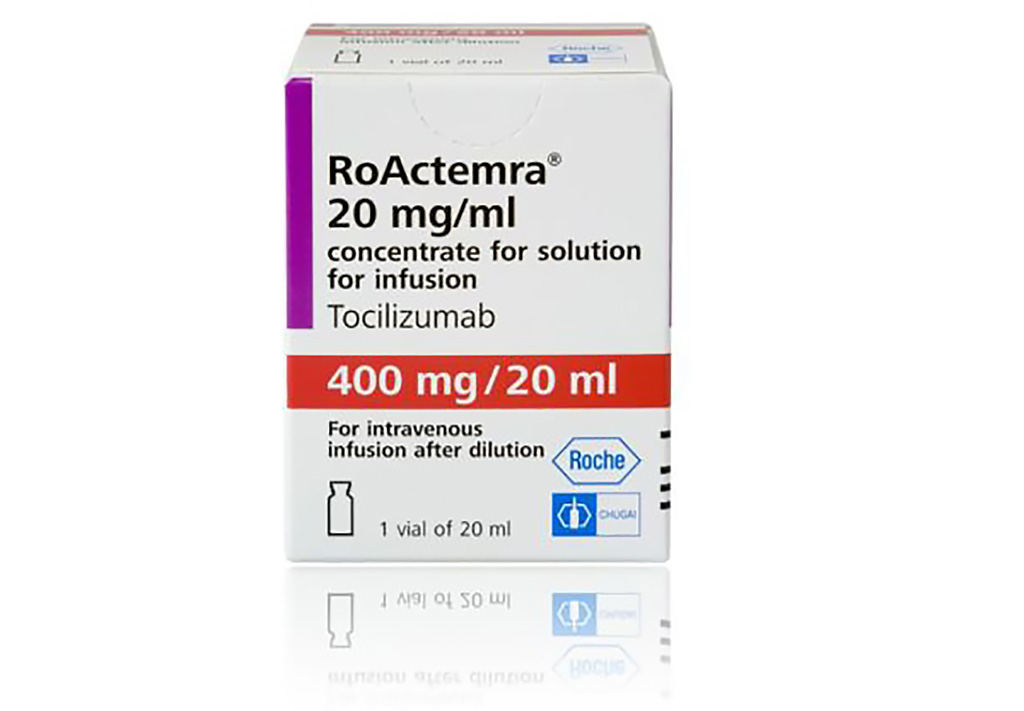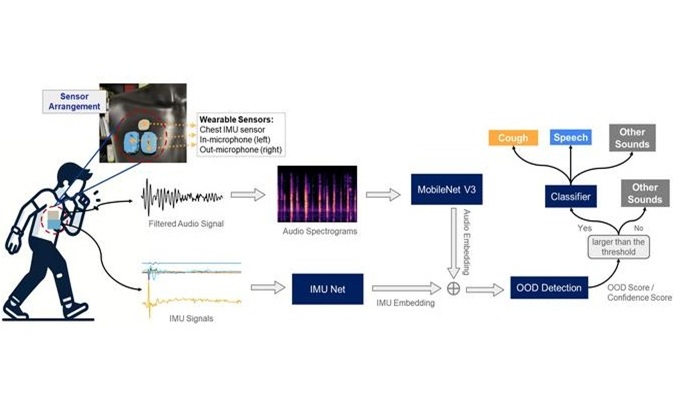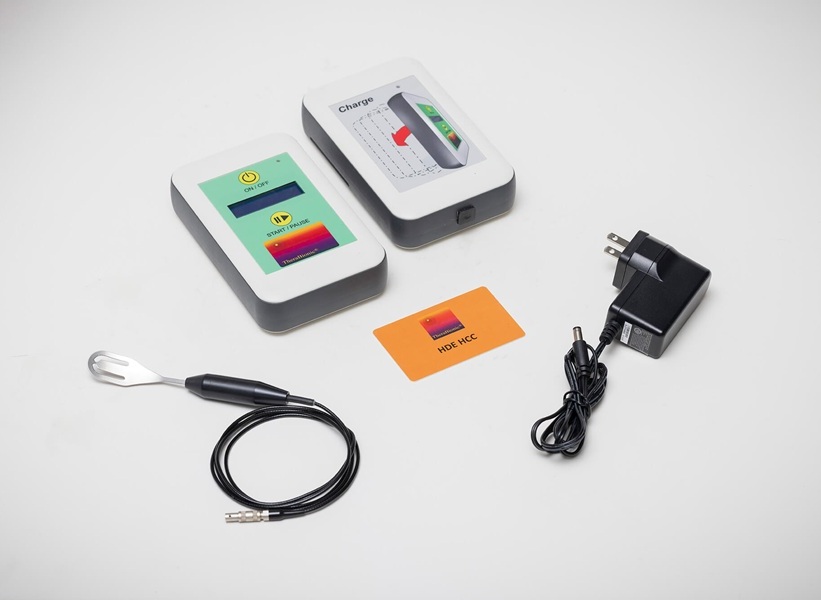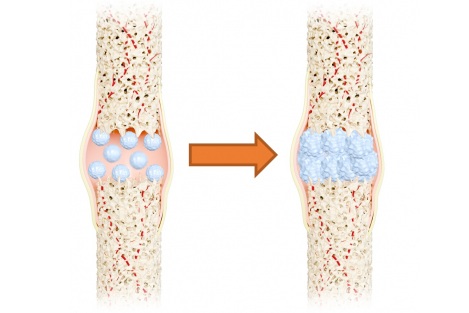Arthritis Drug Tocilizumab Found Effective in Treating Sickest COVID-19 Patients
|
By HospiMedica International staff writers Posted on 20 Nov 2020 |

Image: Anti-inflammatory drug tocilizumab (Actemra) (Photo courtesy of Roche)
Critically ill COVID-19 patients treated with the arthritis drug tocilizumab are significantly more likely to have improved outcomes, according to a new study.
The early findings, which are yet to be published, come from the REMAP-CAP trial, led by the Imperial College London (London, UK) and the Intensive Care National Audit & Research Centre (ICNARC) in the UK and Utrecht University (Utrecht, the Netherlands). The trial evaluates the effect of treatments on a combination of survival and length of time patients need support in an intensive care unit (ICU).
The results show that treatment with tocilizumab, an immunosuppressive drug used to treat rheumatoid arthritis, reached a key efficacy endpoint among critically ill patients with severe COVID-19, compared to patients who did not receive any immune modulation treatment. Patients receiving tocilizumab were more likely to improve (measured by a combination of organ support, such as a breathing machine, in the ICU and surviving the hospital admission) compared to patients who received no immune modulator.
The relative contribution of survival and reduced length of time needing organ support in ICU has not yet been analyzed. The trial does not yet know the relative benefits of tocilizumab compared to the other immune modulators. Further data are expected in the coming weeks and months. Due to the clinical implications for patients, the researchers have released the findings before they have been peer-reviewed, but are working to analyze and publish the full results as soon as possible.
“These early findings show that treatment with this immune modulating drug is effective for critically ill COVID-19 patients in intensive care units,” said Professor Anthony Gordon, Chair in Anesthesia and Critical Care at Imperial College London and a Consultant in Intensive Care Medicine at Imperial College Healthcare NHS Trust. “When we have the results available from all participants, we hope our findings will offer clear guidance to clinicians for improving the outcomes of the sickest COVID-19 patients.”
Related Links:
Imperial College London
Utrecht University
The early findings, which are yet to be published, come from the REMAP-CAP trial, led by the Imperial College London (London, UK) and the Intensive Care National Audit & Research Centre (ICNARC) in the UK and Utrecht University (Utrecht, the Netherlands). The trial evaluates the effect of treatments on a combination of survival and length of time patients need support in an intensive care unit (ICU).
The results show that treatment with tocilizumab, an immunosuppressive drug used to treat rheumatoid arthritis, reached a key efficacy endpoint among critically ill patients with severe COVID-19, compared to patients who did not receive any immune modulation treatment. Patients receiving tocilizumab were more likely to improve (measured by a combination of organ support, such as a breathing machine, in the ICU and surviving the hospital admission) compared to patients who received no immune modulator.
The relative contribution of survival and reduced length of time needing organ support in ICU has not yet been analyzed. The trial does not yet know the relative benefits of tocilizumab compared to the other immune modulators. Further data are expected in the coming weeks and months. Due to the clinical implications for patients, the researchers have released the findings before they have been peer-reviewed, but are working to analyze and publish the full results as soon as possible.
“These early findings show that treatment with this immune modulating drug is effective for critically ill COVID-19 patients in intensive care units,” said Professor Anthony Gordon, Chair in Anesthesia and Critical Care at Imperial College London and a Consultant in Intensive Care Medicine at Imperial College Healthcare NHS Trust. “When we have the results available from all participants, we hope our findings will offer clear guidance to clinicians for improving the outcomes of the sickest COVID-19 patients.”
Related Links:
Imperial College London
Utrecht University
Latest COVID-19 News
- Low-Cost System Detects SARS-CoV-2 Virus in Hospital Air Using High-Tech Bubbles
- World's First Inhalable COVID-19 Vaccine Approved in China
- COVID-19 Vaccine Patch Fights SARS-CoV-2 Variants Better than Needles
- Blood Viscosity Testing Can Predict Risk of Death in Hospitalized COVID-19 Patients
- ‘Covid Computer’ Uses AI to Detect COVID-19 from Chest CT Scans
- MRI Lung-Imaging Technique Shows Cause of Long-COVID Symptoms
- Chest CT Scans of COVID-19 Patients Could Help Distinguish Between SARS-CoV-2 Variants
- Specialized MRI Detects Lung Abnormalities in Non-Hospitalized Long COVID Patients
- AI Algorithm Identifies Hospitalized Patients at Highest Risk of Dying From COVID-19
- Sweat Sensor Detects Key Biomarkers That Provide Early Warning of COVID-19 and Flu
- Study Assesses Impact of COVID-19 on Ventilation/Perfusion Scintigraphy
- CT Imaging Study Finds Vaccination Reduces Risk of COVID-19 Associated Pulmonary Embolism
- Third Day in Hospital a ‘Tipping Point’ in Severity of COVID-19 Pneumonia
- Longer Interval Between COVID-19 Vaccines Generates Up to Nine Times as Many Antibodies
- AI Model for Monitoring COVID-19 Predicts Mortality Within First 30 Days of Admission
- AI Predicts COVID Prognosis at Near-Expert Level Based Off CT Scans
Channels
Critical Care
view channel
Origami Robots to Deliver Medicine Less Invasively and More Effectively
Delivering medicine to ulcers or other internal sites often requires invasive procedures that can disrupt surrounding tissues and lengthen recovery times. Traditional magnetic actuators used in soft robotics... Read more
Improved Cough-Detection Technology Aids Health Monitoring
Coughing serves as an important biomarker for tracking a variety of conditions and can help monitor the progress of respiratory diseases or predict when someone’s asthma is being exacerbated.... Read moreSurgical Techniques
view channel
Novel Glue Prevents Complications After Breast Cancer Surgery
Seroma and prolonged lymphorrhea are among the most common complications following axillary lymphadenectomy in breast cancer patients. These postoperative issues can delay recovery and postpone the start... Read more
Breakthrough Brain Implant Enables Safer and More Precise Drug Delivery
Delivering medication directly to specific regions of the brain has long been a major challenge in treating neurological disorders. Current implants and infusion systems typically reach only one or two... Read morePatient Care
view channel
Revolutionary Automatic IV-Line Flushing Device to Enhance Infusion Care
More than 80% of in-hospital patients receive intravenous (IV) therapy. Every dose of IV medicine delivered in a small volume (<250 mL) infusion bag should be followed by subsequent flushing to ensure... Read more
VR Training Tool Combats Contamination of Portable Medical Equipment
Healthcare-associated infections (HAIs) impact one in every 31 patients, cause nearly 100,000 deaths each year, and cost USD 28.4 billion in direct medical expenses. Notably, up to 75% of these infections... Read more
Portable Biosensor Platform to Reduce Hospital-Acquired Infections
Approximately 4 million patients in the European Union acquire healthcare-associated infections (HAIs) or nosocomial infections each year, with around 37,000 deaths directly resulting from these infections,... Read moreFirst-Of-Its-Kind Portable Germicidal Light Technology Disinfects High-Touch Clinical Surfaces in Seconds
Reducing healthcare-acquired infections (HAIs) remains a pressing issue within global healthcare systems. In the United States alone, 1.7 million patients contract HAIs annually, leading to approximately... Read moreHealth IT
view channel
Printable Molecule-Selective Nanoparticles Enable Mass Production of Wearable Biosensors
The future of medicine is likely to focus on the personalization of healthcare—understanding exactly what an individual requires and delivering the appropriate combination of nutrients, metabolites, and... Read moreBusiness
view channel
Philips and Masimo Partner to Advance Patient Monitoring Measurement Technologies
Royal Philips (Amsterdam, Netherlands) and Masimo (Irvine, California, USA) have renewed their multi-year strategic collaboration, combining Philips’ expertise in patient monitoring with Masimo’s noninvasive... Read more
B. Braun Acquires Digital Microsurgery Company True Digital Surgery
The high-end microsurgery market in neurosurgery, spine, and ENT is undergoing a significant transformation. Traditional analog microscopes are giving way to digital exoscopes, which provide improved visualization,... Read more
CMEF 2025 to Promote Holistic and High-Quality Development of Medical and Health Industry
The 92nd China International Medical Equipment Fair (CMEF 2025) Autumn Exhibition is scheduled to be held from September 26 to 29 at the China Import and Export Fair Complex (Canton Fair Complex) in Guangzhou.... Read more

















